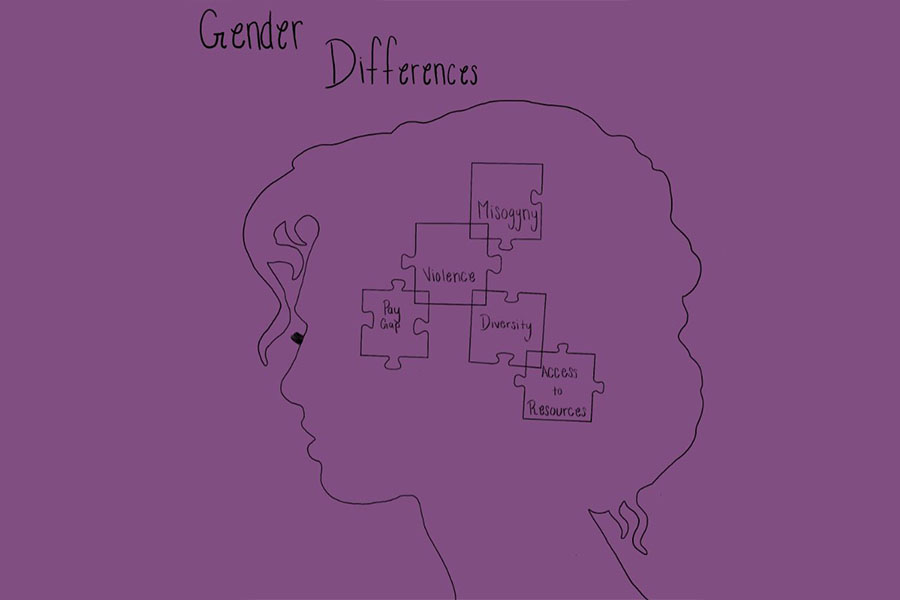During the first week of my on-campus pilates class, my instructor, Elizabeth Shannon Rohrer, stressed the importance of disconnecting from our cell phones for a little bit of the day and spending some time with your own body. She encouraged us to leave our cell phones behind during class time to accomplish this.
During the second week of class, I walked in and laid my mat in the back corner of the room. I couldn’t help but notice another student standing next to the hall door in the same corner on her cell phone.
“Hi,” she said. “Could you send someone to my class? My professor is locked in the other room and can’t get out with her key.”
Once the campus police came to the rescue, Rohrer laughed at her own situation. She didn’t have her cell phone on her, just as she had encouraged, and the reason she got stuck was because her electronic key stopped working.
Ironic, right? Technology, in any form, has become both a blessing and a curse.
In today’s society it’s difficult to not be connected to technology, especially with the accessibility, efficiency and convenience of smartphones. We have all become so accustom to having this loyal little computer by our side, but what are the real effects of this dependent relationship? We all know the benefits, but what are the downfalls?
There are many studies showing scientifically how our connectivity affects us: sleep patterns, relationships with others, a rise in distraction, added stress and even the phantom vibration phenomenon.
Phantom vibration syndrome is having the feeling that your device is vibrating when it really isn’t. It is a sign that your brain has changed itself to trigger an almost compulsive behavior of picking up and looking at your phone. This change in brain activity is fairly recent, just as the smartphone generation came about.
A 2012 study titled “Phantom vibrations among undergraduates: Prevalence and associated psychological characteristics” states that 89 percent of the 290 samples had experienced the syndrome, but very few of those sampled were bothered by them.
Some people may not realized how bothersome our cell phone usage have become to them though. Studies have found that our increased use has lead to higher stress and anxiety levels.
A study from the University of Wisconsin titled Blurring Boundaries? Linking Technology use, Spillover, Individual Distress, and Family Satisfaction explains how such a seemingly harmless habit turns negative.
“Computing and communications technology use increases the permeability of work/ family boundaries…because these technologies provide additional ways to access individuals anytime, anywhere,” states the study.
For example, having one’s work email on their phone is a quick way to increased stress due to the easier accessibility outside of the workplace. Instead of enjoying the time at home with yourself or with family, time is spent going through emails, looking at instagram pictures or Snapchat stories you missed while you slept, or catching up on the latest gossip on Facebook, muddling your brain early on in the day.
So the solution would just be to put the phone down for a while, right? Easier said than done.
Why are we so attached to our cell phones? Laura Forsyth, counseling psychologist at Moorpark College, held a lecture titled Smartphones: Your servant or your master? in which she explained the reasoning behind our seemed addiction.
“Us humans have far less spontaneous conscious control over our smartphones then we think we do,” said Forsyth.
In her lecture, she explains how our brains control our attention, motivation and habit through the basal ganglia.
“Habitual routines of behavior shaped by classical conditioning queued by a variety of stimulus and reinforced and strengthened by positive and negative reinforcement,” said Forsyth.
This is why we respond so quickly when we hear our phone go off. It’s become an unconscious habit. These types of habits have been extensively studied and are exploited by those who create technology and applications. They’re essentially using the Pavlov theory.
Now you have an idea about how deep in our psych this dependency can run. But what about on the surface?
In Forsyth’s lecture, she briefly discusses how posture of people who are of college age are affected by our constant technology use. She claims that as your body is forming, you’re spending a whole lot of time with your head down, which causes neck pain.
“It’s about 12 pounds of pressure [on the back of my neck] and the more my head goes down, the more pressure there is,” Forsyth said. “People spend amazing amounts of time in this position. And our necks aren’t really made for that.”
Distraction has also become a huge issue with the rise of smartphones. Attention problems, sleep deprivation and, of course, motor vehicle accidents are all results of the dependency.
According to Forsyth’s lecture, in 2012, 3,328 people died in fatal car accidents and 421,000 were injured due to distractedness. In 2011, 1,152 ended up in the hospital due to injury from distracted walking.
Technology not only distracts us from our actions, but also from the people we love. Relationships with significant others, friends and family are all suffering due to the increasingly intimate relationship we are nurturing with our devices.
Allison Barton, Moorpark College’s health educator, finds technology to be more of a positive thing, but has grown very concerned for the art of conversation. She feels technology use is affecting the way we communicate. In fact, it is causing a lot of miscommunication.
“Unless you know the person very, very well, it’s really hard to understand what they really mean even though the words are on the paper,” said Barton. “We as human beings need 90 percent of our communication from body language.”
With our phones always in front of our faces, how is it that we can be maintaining a meaningful conversation? While I feel emojis may help through text, I don’t think that quite solves the problem.
How can we solve the problem? Well, I don’t know. But there are ways to help make the impacts less severe. To take control back into our own hands.
“As [technology] evolves, my self-control has to evolve,” said Barton. “I think I need to learn how to set limits better and I think everyone needs to learn to set limits better.”
Setting boundaries, increasing self-control, taking time for yourself to disconnect; all perfect ways to lessen your dependency.
For example, when out with friends at dinner, have everyone place their phones in a pile in the middle of the table. The first person who reaches for their phone has to buy dinner.
Technology is a beautiful thing. Without it, our lives would be much more inconvenient, much less efficient and much less creative. Technology provides access to infinite information online, endless games to fill our time, medical equipment that could save lives and of course, a feeling of connection with everyone and anyone you could wish to connect with.
There is no doubt that technology is here to stay, but we need to learn how to not let it control us. Don’t let yourself become a slave to it; and in Rohrer’s case, don’t let your lack of it put you in danger.













